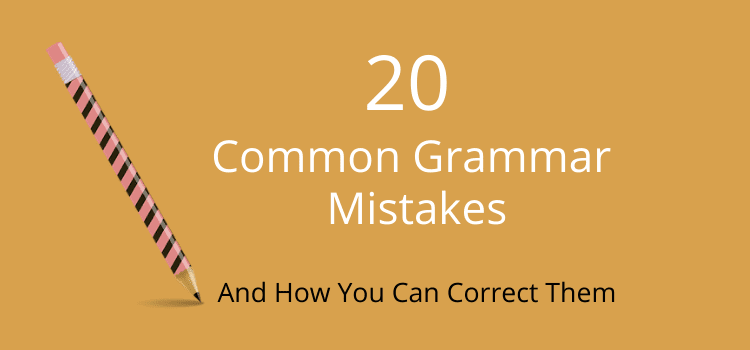
Every writer tries to write without making basic English grammar errors. However, readers are quick to notice common grammar mistakes in any form of writing.
It doesn’t matter if you are writing a blog post, an article, a novel, or even a social media post. You want to make sure people understand, appreciate, and enjoy your work.
You should always double-check that you are using correct grammar. Today, lots of people are taking up writing, either for pleasure or as a way to make an income.
For new writers, it is essential to use a grammar check, improve, and keep learning the writing craft.
Always correct your basic grammar mistakes
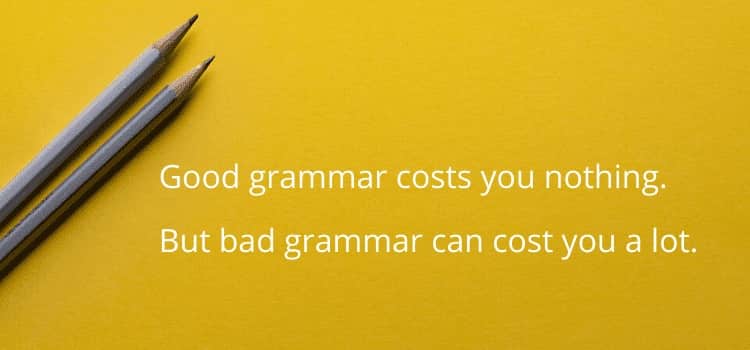
One of my pet dislikes is reading any form of writing that is full of basic grammar mistakes.
I get a lot of messages and emails from writers every day.
Unfortunately, more than a few contain careless and very common grammar mistakes, spelling errors, and typos.
It doesn’t make a very good impression on me when a writer fails to use standard capitalization and punctuation. And worse when there are glaring spelling mistakes.
Sloppy writing and carelessness are not the same as trying hard to follow more complex grammar rules.
But perhaps you do not quite get them right all the time.
The best way to help you improve the quality of your writing is to use a top-quality grammar checker. A good grammar corrector and spell check can help you fix your mistakes before you publish your text.
However, be careful because an online checker will not find every error for you. This is especially the case for numbers in writing.
You still have to make decisions about specific grammar points using your judgment to make sure that you use a phrase or word correctly.
The 20 most common grammar mistakes
For writers who want to continue to improve, here are twenty common grammar mistakes that are easy to get wrong. We all make a few errors from time to time.
Luckily, they are all very simple to fix, and you can make them grammatically correct if you know how to do it.
1. Subject-verb agreement
The verb must agree with the subject of the sentence. It is one of the most common grammatical errors.
It’s especially tricky when writing about teams, organizations, governments, or companies. An error can also occur when plural subjects are separated.
Depending on the subject, even a good grammar check might often get it wrong.
Examples:
Barnes and Noble are one of the biggest bookstore chains in the United States. (Incorrect)
Barnes and Noble is one of the biggest bookstore chains in the United States. (Correct)
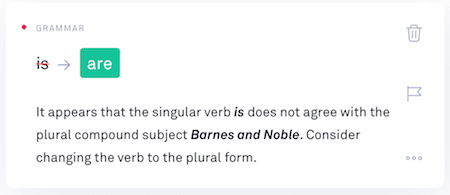
As you can see from the Grammarly Card above, the suggested correction is not accurate. You need to know the rules to make the right choice.
The Detroit Tigers are a Major League baseball team. (Incorrect)
The Detroit Tigers is a Major League baseball team. (Correct)
Waterstones are a British book retailer that operates 283 shops, mainly in the UK. (Incorrect)
Waterstones is a British book retailer that operates 283 shops, mainly in the UK. (Correct)
Jane Moore, Mike Smith as well as John Green is being promoted. (Incorrect)
Jane Moore, Mike Smith as well as John Green are being promoted. (Correct)
Note: In US English, collective nouns are almost always singular and not plural. However, in British English, the rule is not quite as rigid.
2. Tense agreement
Changing the tense within a sentence is a common writing error. If a sentence starts in the present tense, it should not change to the past tense.
Examples:
He starts the car and then accelerated away in a cloud of tire smoke. (Incorrect)
He started the car and then accelerated away in a cloud of tire smoke. (Correct)
Who said writing is easy? (Incorrect)
Who says writing is easy? (Correct) or Who said writing was easy? (Correct)
3. No comma after an introductory element
A comma should separate words and phrases that come before the main clause in a sentence.
It is often a problem with sentences that begin with because.
Examples:
Just in case you are worried I’ll be home by twelve. (Incorrect)
Just in case you are worried, I’ll be home by twelve. (Correct)
Therefore I shall wait until I am called. (Incorrect)
Therefore, I shall wait until I am called. (Correct)
Because of the rain I was late for work. (Incorrect)
Because of the rain, I was late for work. (Correct)
4. Split infinitives
Correct sentences should rarely use the split infinitive. What this means is that the “to” must stay directly connected to its verb. We all know, to be or not to be.
Examples:
I wanted to quickly dash off to the supermarket. (Incorrect)
I wanted to dash off quickly to the supermarket. (Correct)

Apologies in advance to Star Trek fans here.
To boldly go where no man has gone before. (Incorrect)
To go boldly where no man has gone before. (Correct)
5. Unclear pronoun reference
A pronoun refers to a specific noun in the previous sentence or clause. However, it is very easy to use an unclear pronoun, which can confuse a reader.
Examples:
When Brad started arguing with Claude, he went red in the face. (Incorrect)
It is unclear who went red in the face. In this sentence, we don’t know if it was Brad or Claude who got angry.
When Brad started arguing with Claude, Brad went red in the face. (Correct)
Mary and Tom are going out again and thinking of getting married. This is why I am so upset. (Incorrect)
It is unclear what this refers to and why he or she is upset. Does it refer to going out or getting married or to the fact that Mary is with Tom again?
Mary and Tom are going out again and thinking of getting married. I am so upset with Mary for even thinking about marrying Tom. (Correct)
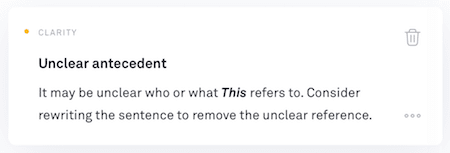
6. Incorrect apostrophe use with it’s and its
It is one of the easiest mistakes to make in the English language. Not only that, it is sometimes difficult to notice the error when proofreading.
The word its is a possessive pronoun. Something must belong to it.
The word it’s is a contraction of it is.
The same error often occurs with your, and you’re, for the same reasons.
Examples:
Its time we got moving. (Incorrect)
It’s time we got moving. (Correct) It is time we got moving.
It’s cover is made of beige leather. (Incorrect)
Its cover is made of beige leather. (Correct) The book cover is made of beige leather.
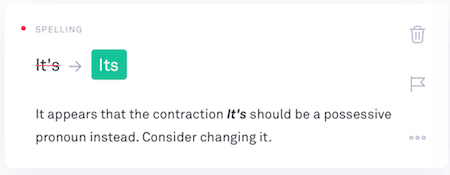
Your late for dinner again. (Incorrect)
You’re late for dinner again. (Correct)
You’re father will not be happy about this. (Incorrect)
Your father will not be happy about this. (Correct)
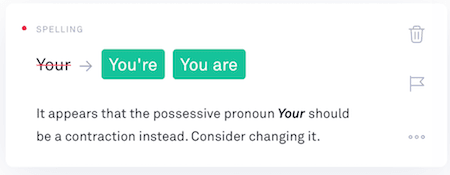
7. Parallel structure errors
Parallelism errors occur when parts of a sentence are comparable in meaning but not grammatically the same in form. It happens with joined constructions and things in a series or list.
Examples:
I have been thinking about signing up to study phonetics, literary devices, and an English teacher. (Incorrect)
I have been thinking about signing up to study phonetics, literary devices, and English teaching. (Correct)
I really need to concentrate on grammar, spelling, and my punctuating. (Incorrect) Mixing verbs and nouns.
I really need to concentrate on grammar, spelling, and punctuation. (Correct) All nouns.
8. Misplaced or dangling modifiers
Dangling or misplaced modifiers occur when poor adjective placement makes it unclear as to what noun it is describing.
Examples:
I was on my way to work and noticed a cream woman’s handbag in the gutter. (Incorrect)
It is unclear if the handbag belongs to a cream woman or if the handbag is cream. The modifier needs to be moved next to the word it is modifying.
I was on my way to work and noticed a woman’s cream handbag in the gutter. (Correct)
My new girlfriend ordered an expensive plate of lobster at the restaurant last night. (Incorrect)
The plate was not expensive. It was the lobster.
My new girlfriend ordered a plate of expensive lobster at the restaurant last night. (Correct)
9. Sentence fragments
The common cause of a fragment is that the sentence or clause requires a subject-verb construction. Or that there is a separate prepositional phrase or dependent clause.
Examples:
Looking forward to meeting you next Sunday. (Incorrect)
I’m looking forward to meeting you next Sunday. (Correct)
I found a great new position in tech. The remedy for all my financial problems. (Incorrect)
I found a great new position in tech, which will be the remedy for all my financial problems. (Correct)
10. A run-on sentence
A run-on sentence is also called a fused sentence.
The mistake happens when two independent clauses, which are, in fact, complete sentences, are joined without being properly connected.
Using conjunctions such as and, but, for, nor, yet, or, and because can usually fix the problem.
Examples:
The next step will be tough, you should get ready as soon as you can. (Incorrect)
The next phase will be tough, so you should get ready as soon as you can. (Correct)
I can’t figure out how to set up this rice cooker, it came without an instruction manual. (Incorrect)
I can’t figure out how to set up this rice cooker because it came without an instruction manual. (Correct)
11. Unnecessary and redundant commas
Commas are not punctuation marks you add just because they feel right or where you think you should take a breath.
The most common mistake is to use them before conjunctions such as because, and, as well as or. (See point 19 for details about commas with coordinating conjunctions.)
Examples:
I rarely go to the city center, because I hate the crowds. (Incorrect)
I rarely go to the city center because I hate the crowds. (Correct)
He says he wants to start a new course in writing, or literature. (Incorrect)
He says he wants to start a new course in writing or literature. (Correct)
I like bananas, and oranges. (Incorrect)
I like bananas and oranges. (Correct)
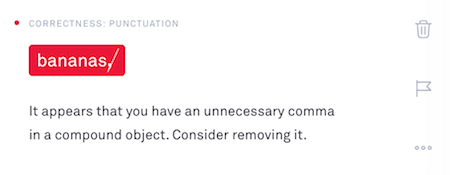
12. The Oxford comma
The Oxford comma or serial comma is used to avoid confusion. It is generally used in lists to ensure that the last item is separated.
Examples:
For dinner tonight, I will cook beef stew, new potatoes, green beans and ice cream. (Incorrect)
Without a comma, the green beans will be served with the ice cream.
For dinner tonight, I will cook beef stew, new potatoes, green beans, and ice cream. (Correct)
I was shocked to find myself alone with my teacher, a greenie and a vegetarian. (Incorrect)
There is only one person present in this sentence. My teacher, who is also a greenie and a vegetarian.
I was shocked to find myself alone with my teacher, a greenie, and a vegetarian. (Correct)
Now there are three people present. My teacher, a greenie, and a vegetarian.
13. A comma splice
A comma splice happens when two sentences are joined with a comma instead of a full stop (period) or semicolons.
Linking words, such as however, therefore, moreover, nevertheless, or furthermore, are often a cause of the problem.
Examples:
I wanted to go out for dinner before we went to the cinema, however I decided to go after instead. (Incorrect)
I wanted to go out for dinner before we went to the cinema. However, I decided to go after instead. (Correct)
My friends and I like to go skiing, we have so much fun together on the weekends in winter. (Incorrect)
My friends and I like to go skiing. We have so much fun together on the weekends in winter. (Correct)
14. Wrong word selection
Affect and effect and accept and except cause the most significant problems. Be careful with commonly confused words, and make sure you use the right word in the context of your sentences.
Examples:
John excepted with pleasure his generous offer to start in a new, more senior position. (Incorrect)
John accepted with pleasure his generous offer to start in a new, more senior position. (Correct)
The book effected me so deeply, I cried. (Incorrect)
The book affected me so deeply, I cried. (Correct)
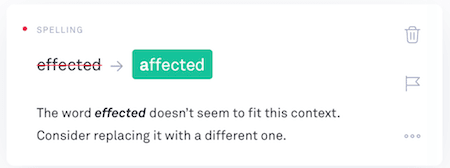
More Reading: A Damp Squib Or Damp Squid?
15. Colon errors
The colon is placed after a whole sentence to add a word, phrase, clause, list, or quotation. The colon says that what follows proves or explains the sentence before a colon.
Examples:
Retired people move south for: warmer weather, the beaches, and cheaper retirement living. (Incorrect)
Retired people move south for three reasons: warmer weather, the beaches, and cheaper retirement living. (Correct)
In summer I like to eat: ice cream and lettuce. (Incorrect)
In summer I like to eat two things: ice cream and lettuce. (Correct)
16. Em dash instead of an en dash
An en dash is most often used to indicate the sense of “through to” in dates or number sequences. Note that there is no space on each side of the dash.
The festival will be held 17–20th July.
Please refer to pages 247–522 for more in-depth details.
The main use of the em dash is to highlight information, which would often be enclosed in commas, parentheses, or following a semicolon.
Examples:
Liver, kidney, and trotters are foods I just can’t eat.
Liver, kidney, and trotters—all foods I just can’t eat.
Mary, Chris, and Mark attended the meeting with the boss.
The three of them—Mary, Chris, and Mark—attended the meeting with the boss.
17. Incomplete comparisons
This error occurs when you make a comparison in your sentence structure, but it is not clear what you are comparing.
Generally, if you make a comparison without including the word, than, it is incomplete.
Examples:
Montreal is much colder. (Incorrect)
Montreal is much colder than Toronto. (Correct)
My brother is a lot older. (Incorrect)
My brother is a lot older than me. (Correct)
18. Sentence sprawl
Sprawling sentences are usually caused by connecting too many clauses or phrases with comma separators.
It is almost always best to divide long, sprawling sentences into shorter and clearer sentences.
Examples:
Mike had intended to go to his neighbor’s wedding on August 30, but at the last minute, he discovered that he had been called up for jury duty, so he wouldn’t be able to attend the wedding, and he felt dreadful about not being able to go. (Incorrect)
Mike had intended to go to his neighbor’s wedding on August 30. However, at the last minute, he discovered that he had been called up for jury duty.
He knew he wouldn’t be able to attend the wedding. He felt dreadful about not being able to go. (Correct)
19. Missing comma in a compound sentence
When you join two independent clauses together with coordinating conjunctions such as and, but, or, nor, for, so, or yet, you need to add a comma before the coordinating conjunction. It is a very common error.
Examples:
I understand that you need to work late nights but you really should find some time to relax. (Incorrect)
I understand that you need to work late nights, but you really should find some time to relax. (Correct)
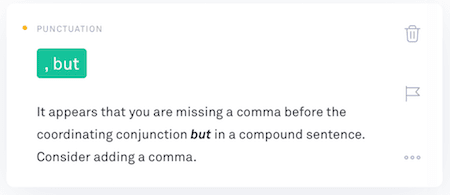
The bank robber quickly got into a black SUV and sped away from the crime scene before anyone noticed. (Incorrect)
The bank robber quickly got into a black SUV, and sped away from the crime scene before anyone noticed. (Correct)
20. Less vs. fewer
This is one of the most common grammar mistakes. So common that it is made by mother-tongue English speakers all the time.
Have you noticed that many supermarkets have a “10 items or less” checkout? It is grammatically incorrect. It should read, “10 items or fewer.”
This grammar point is one of my pet peeves. Less is used when referring to uncountable nouns. Fewer is used for countable nouns.
Examples:
I have less friends than my sister. (Incorrect)
I have fewer friends than my sister. (Correct)
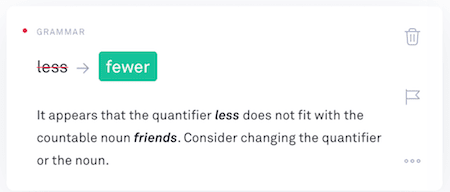
You have less opportunities for promotion in a government job. (Incorrect)
You have fewer opportunities for promotion in a government job. (Correct)
Conclusion
Writing well is not an easy task.
You need to pay attention to every word or phrase you write and check carefully for any grammatical errors.
If you make basic grammar mistakes, your bad grammar will fail to win new readers.
Sure, you can use a grammar checker to catch 95% of your writing errors. It offers you a lot of help in reducing your mistakes.
But you still need to know what is right and wrong to make good decisions, like when to use active voice instead of passive voice.
However, nothing improves your writing faster than developing your grammar knowledge.
The twenty common grammar mistakes listed in this article are a great start.
Keep working on adding to your grammar knowledge and understanding to make you an even better writer.
Related reading: A Dangling Modifier Is Simple To Fix If You Know How To Do It
Share This Article
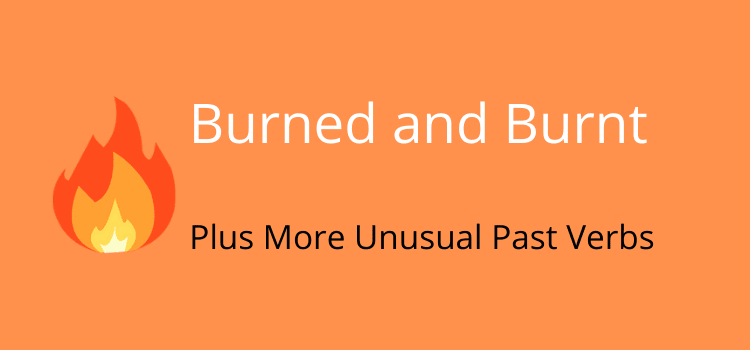
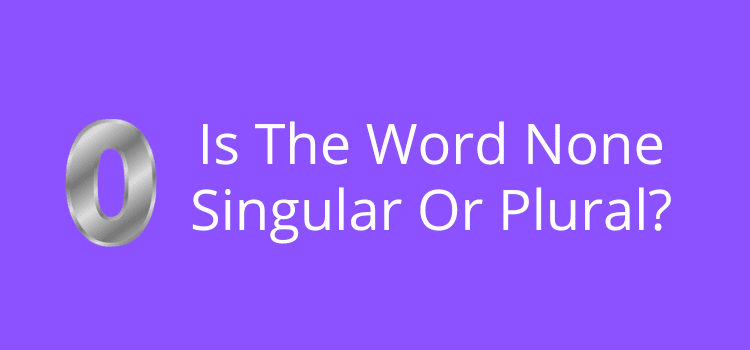

What a great site, so much clear info, but we need the book to buy and download, many thanks Mr. Haines Wes,
This article is some grat examples and explains clearly hows the best writing formats I think,
I enjoyed reading this list. Your examples are easily understood. However, you omitted my favorite error to hate — the “I” instead of “me.” Susan and I went to the store (correct). Jerry gave the information to Susan and I (incorrect). This is so prevalent, I was sure you would include it. I hear it all over the place, even from journalists in media.
Yes, I agree we hear this error so often, and especially in the media. I don’t see it as often in writing, but it is a common mistake. Maybe I’ll have to expand my list to 21!
Hello,
I came across your page while having a grammar discussion with my wife. I think it’s great page. I have an observation and a question.
It seems to me, the section 15 guideline regarding colon usage might apply to your explanations in section 12. Would it be more correct to use a colon instead of a period between the sentences?, i.e., “Now there are three people present: my teacher, a greenie, and a vegetarian.” and, “There is only one person present in this sentence: my teacher, who is also a greenie and a vegetarian.”
I hope i got all my punctuation correct. Thank you in advance for your response.
Mitch
I’m happy to hear that this post attracted your attention, Mitch. Well, as with all things grammar and punctuation, there are many interpretations. I have to say that in the examples you mentioned, there are lots of ways to correctly punctuate. If you use an Oxford comma, for example, there might not be a need to use a colon. The main aim of good punctuation is to make your message clear. But the choices, especially between US and UK English are numerous. Perhaps there are no right or wrong methods, Just the best options to make your sentences as clear as possible. Btw, your punctuation wasn’t too bad at all.
Can you update this great and valuable article to include another common writing mistake — ending a sentence with a preposition. I have found this mistake in numerous articles, including newspapers and the magazine, including the Economist. A grammar checker will [should] find this error, so when I read something that has been published with the word “of”, I immediately think the writer/editor failed to use one.
Yes, Elizabeth. Ending a sentence with a preposition is something up with which I will not put, as Churchill said. But then again, as you say, it is in such common usage. It is hard to call it a mistake today. I think that was Churchill’s point, and ahead of his time in saying so. It is something we might just have to put up with.
This is a great article with very helpful tips. There’s only one exception that might lead to confusion. Especially if a reader doesn’t complete the article. In #11 you write “The most common mistake is to use them (commas) before conjunctions.” But in #19 the nearly opposite is stated. I realize it’s referring to comma usage when joining two independent clauses, but I was thinking about the confusion that might be caused if a reader saw #11 as a hard grammar rule. I added an asterisk there before forwarding the article to my niece. She begins high school next week, and your article will certainly be a helpful resource to her. I’ve bookmarked it for myself, as well.
Thanks for the informative read!
Great source of for a quick guide when I’m confused. I bookmarked this post. Thank you.
Danke Schorn for the list. I printed it off and it hangs on my clipboard which I reference constantly.
Great to hear it is a useful resource, William.
Everyone, writer or non-writer, should read this. Every English speaker in the world!
You have made some things much clearer to me than before. Some things it’s just the names. I had heard of a comma splice, but had no idea what it was.
I also hate the use of less instead of fewer (also amount instead of number).
I seeone of the replies says the person has printed out the list. I think I’ll do the same.
You have described the reason why writers need an editor. Inside a tsunami of words, it’s hard to think about more pressing matters than surviving the onslaught. :-)